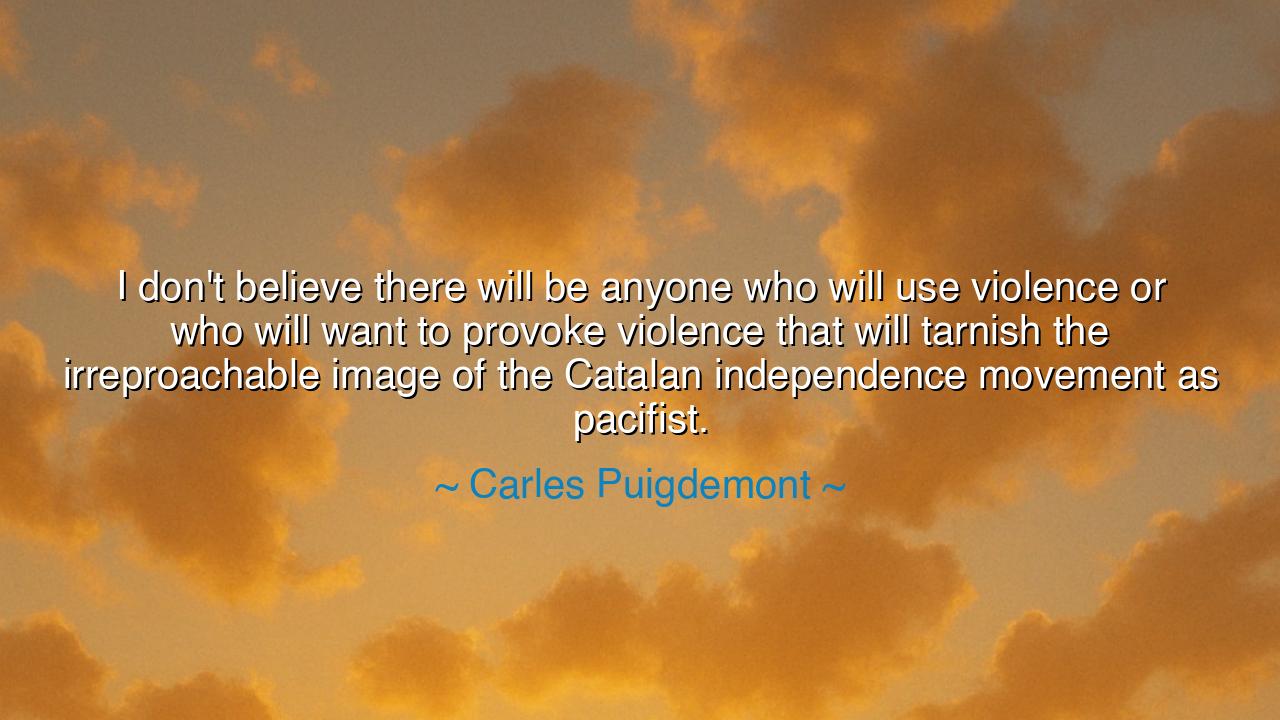
I don't believe there will be anyone who will use violence or who
I don't believe there will be anyone who will use violence or who will want to provoke violence that will tarnish the irreproachable image of the Catalan independence movement as pacifist.






When Carles Puigdemont declared, “I don't believe there will be anyone who will use violence or who will want to provoke violence that will tarnish the irreproachable image of the Catalan independence movement as pacifist,” he was not merely defending a political stance — he was invoking a moral creed. His words were a pledge to peace, a statement of faith that true independence must be born not from the sword, but from the steadfastness of conscience. In this declaration, Puigdemont placed the struggle of Catalonia within the long lineage of movements that sought freedom not through destruction, but through dignity, discipline, and peace. His voice, firm yet hopeful, carried the conviction that violence corrupts what justice sanctifies, and that a righteous cause must never lose its soul in pursuit of victory.
The origin of this quote lies in the charged and uncertain days of Catalonia’s bid for independence in 2017. Puigdemont, then the President of the Catalan government, stood at the helm of a movement that had ignited both hope and fury across Spain. Amid the tension, as police clashed with demonstrators and the Spanish government declared the referendum illegal, the specter of violence loomed large. Yet Puigdemont refused to let the struggle for Catalonia’s future descend into chaos. He spoke these words as a vow of restraint, as a shield for his people’s moral integrity — to remind the world that their cause, however contested, must remain untainted by bloodshed. For he knew that the purity of an independence movement lies not only in its goals, but in the means by which those goals are pursued.
In these words resounds the echo of the great pacifists of history — men and women who proved that moral power can move mountains where violence only breaks stones. One hears in Puigdemont’s tone the quiet strength of Mahatma Gandhi, who faced the might of empire armed only with truth and suffering. One feels the spirit of Martin Luther King Jr., who proclaimed that “darkness cannot drive out darkness; only light can do that.” Puigdemont’s faith in nonviolence was not born of weakness but of wisdom — the understanding that violence destroys legitimacy, while peace preserves it. For every act of anger may bring momentary satisfaction, but it stains the cause with the very injustice it seeks to overcome.
Yet, Puigdemont’s idealism was not naïve. He knew that the path of peaceful resistance is the hardest of all — for it demands endurance instead of aggression, patience instead of passion. He stood in a moment when his people were provoked, when their will was tested by force, and he called upon them to stand firm without striking back. In doing so, he echoed the wisdom of the ancients: that true strength is not in domination, but in mastery of the self. The warrior who can raise his hand is strong; the one who can stay it is greater still.
Consider the example of Nelson Mandela, who after decades of imprisonment emerged not with vengeance, but with reconciliation in his heart. Had he chosen violence upon his release, South Africa might have drowned in endless blood. But he, like Puigdemont, understood that the image of peace is a nation’s moral armor. It is that image — irreproachable, pure, and disciplined — that moves hearts beyond borders, inspiring allies and silencing critics. When the oppressed answer violence with peace, the world sees clearly where justice lies.
Puigdemont’s statement also carries a warning to all who lead movements of freedom: that the purity of a cause is its greatest treasure, and it must be guarded even more fiercely than victory itself. A single act of brutality can destroy years of moral labor, turning sympathy into suspicion, and heroes into villains. Thus, he called his people not only to courage but to conscience — to remember that the world watches not only what they seek, but how they seek it. His faith that none would tarnish their cause was both a declaration and a challenge — a reminder that the path to liberty must mirror the peace it promises.
So, my children of the future, take this lesson to heart: peace is not weakness, and restraint is not surrender. In every struggle — whether for nation, justice, or truth — let your conduct be as noble as your cause. For violence wins wars, but virtue wins hearts. And it is hearts, not weapons, that build the world anew. When the fires of anger tempt you, remember Puigdemont’s faith in his people — that they would not trade purity for power. Strive to be such as he hoped his nation would be: strong enough to stand firm, and wise enough to remain peaceful. For in that balance lies the truest form of independence — the kind that frees both the land and the soul.






AAdministratorAdministrator
Welcome, honored guests. Please leave a comment, we will respond soon